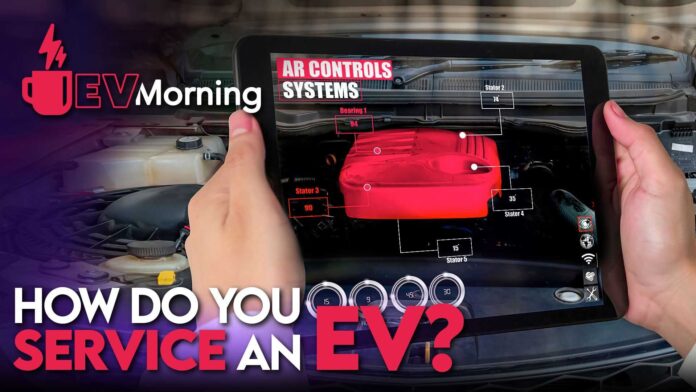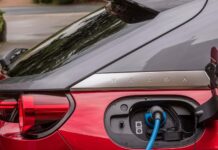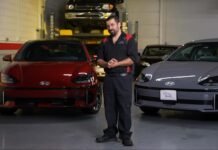[ad_1]

What goes into servicing an EV? It’s a good question, and one that gets forgotten about. We all talk about range, or Tesla’s 0-60mph time or efficiency…but every now and then we need to get an expert to give our EVs the once over.
Today we’re looking at some of the differences between servicing a combustion engine and an EV. Stick around for the details.
Wheels, Brakes and Tires
So let’s start from the ground up…the only part of your car that is actually touching the ground! Tyres are obviously an integral part of any car, and with EVs it’s largely the same as a combustion car. They need to be checked for cracks, uneven wear, and of course the appropriate thread levels. Many EVs are heavier than their combustion counterparts so can suffer a little more tyre wear. Couple that with the instant torque you get in an EV and some EV drivers find they wear a little faster.
In terms of brakes, we’re moving on to one of the best parts of EV servicing…because you hardly ever need to change them. Brake pads and brake discs keep a lot, lot longer in an EV thanks to Regenerative Braking. And if you want to know more about Regen then check out our other video all about that.
The great benefit is that instead of friction brakes clamping down and expelling heat, that energy is used to slow the car and recharge the battery! It means that many EV owners go years without having to change a brake pad or disc!
Battery
The battery in an EV is one of the things that gets the most attention when it comes to talking about maintaining EVs. But in fact there’s isn’t really any moving parts, discounting the electrons of course! For sure, the battery will degrade over time, but it isn’t something that needs to be serviced in a manner that we’re accustomed to. There are specialists out there that can deconstruct a battery pack and replace or rebalance the cells, but this is a very rare occasion and will only take place after a lot of driving!
Expensive battery replacements are spoken about a lot, but EV batteries are lasting so much longer than the naysayers projected. Of course, some older Nissan LEAFs and Zoes are being upgraded, but you’re talking about cars that have been around nearly a decade now!
Motor
So back in the day when you’d take your stinky old diesel in for a service, there’d be a lot to do…timing belts, oil changes, spark plugs, filters… the list goes on and on. In comparison, an EV motor only has about 20 moving parts. At that, most manufacturers will tell you that it’s a sealed unit and essentially needs no maintenance at all!
The Usual Suspects
Let’s talk about the Usual Suspects for a while…because we don’t want to paint a picture that EVs don’t need any serving at all! We’ve mentioned tyres and brakes, but there’s a few other things that EVs need looking after, just like combustion cars.
You will need to get your air filter changed from time to time. Unfortunately, not everyone drives an EV and there’s still a lot of poor air quality out there from various sources. So you’ll want to keep your HVAC system in check. That includes possibly topping up your coolant for the AC.
Other items like the suspension will have to be checked as this can suffer just as much in an EV as a combustion car. The service should also check things like wheel alignment and the lights.
Danger – High Voltage!
The last thing we’d say is squared at you who like to maintain your cars yourself. Heck, I loved doing it a bit before I made the switch to EVs. But a word of warning is to be cautious. An EV may be just a battery, motor and wheels…but the system that makes it all work is powered by some very high voltage wiring. This really is not to be messed with, and best left to experts. Having something like 400 volt architecture is common. And modern cars such as the Porsche Taycan are at 800 volts.
It’s worth doing a bit of research before your EV is next due its service. For example, where I’m based in the UK, we have HEVRA, which is the Hybrid and Electric Vehicle Alliance. They have a list of approved and qualified EV mechanics.
Another benefit of going with an expert is that they’re going to have the relevant diagnostic machinery and software to check your car out. One example is to tap into the BMS, or Battery Management System, to check on how each battery cell is performing.
Cost and Intervals
And finally a word on cost. As you’ve gathered at this stage, there’s a lot less to maintain in an EV. So therefore you shouldn’t have to pay any more to have one serviced. In fact, you should save a bit of money.
As for when you should have your EV serviced, well that comes down to each manufacturer. Some EV drivers have gone tens of thousands of miles without a service and with no known defects. But we are definitely not recommending that! You’re better off following the manufacturers advice to keep the car safe for you and everyone else on the road!
Summary
Do you have an EV? And if so, how have you found maintaining the car since you got it?
Does more need to be done in the industry to train mechanics on EVs?
Be sure to like and subscribe to this YouTube channel to stay up to date with our latest video releases.
[ad_2]
Source link













